Featured
Weibo Watch: Walking on Eggshells
In today’s Chinese social media environment, both foreign brands and local influencers must tread carefully, as even minor missteps can trigger significant consequences.
Published
8 months agoon

PREMIUM NEWSLETTER | ISSUE #14
This week’s newsletter:
◼︎ 1. Editor’s Note – Walking on eggshells
◼︎ 2. What’s Trending – A closer look at the featured stories
◼︎ 3. What More to Know – Highlighting 8 hot topics
◼︎ 4. What Lies Behind – Dr. Pieke on China’s influence and interference
◼︎ 5. What’s Noteworthy – No consent to marry
◼︎ 6. What’s Popular – ‘Secret Agent Missions’
◼︎ 7. What’s Memorable – Meng Wanzhou back to the Motherland
◼︎ 8. Weibo Word of the Week – “Floracash”
Dear Reader,
Tears and apologies don’t seem to mean much in today’s social media era.
Not too long ago, a well-known Chinese female university professor known as ‘Xiangyi’ (相宜) posted an emotional video addressing an issue that happened some time ago. The professor, who previously became an internet celebrity with millions of followers, vanished from the public eye in 2022 due to criticism for her use of the phrase “our Japan” (“我们日本”) during a livestream when discussing Japanese authors and their works.
Xiangyi said “our Japan” three times and it sparked backlash, as viewers interpreted it as a sign of her loyalty to Japan over China. In her tearful video, she explained that it was merely a figure of speech (“口头语”), akin to saying, “This is our Teacher Zhang,” when introducing someone; “He is one of our Japanese authors.” While her choice of words did reflect her affection for the authors, it wasn’t necessarily an indicator of her greater commitment to Japan over China.
However, the consequences for Xiangyi were severe. She felt compelled to resign from her university position due to ongoing online harassment and “malicious reports.”
Xiangyi’s tearful video failed to garner sympathy from netizens, mirroring the response to ‘Lipstick King’ Li Jiaqi’s recent apology video for controversial comments made during a live stream. Both were dismissed as insincere and too little, too late.
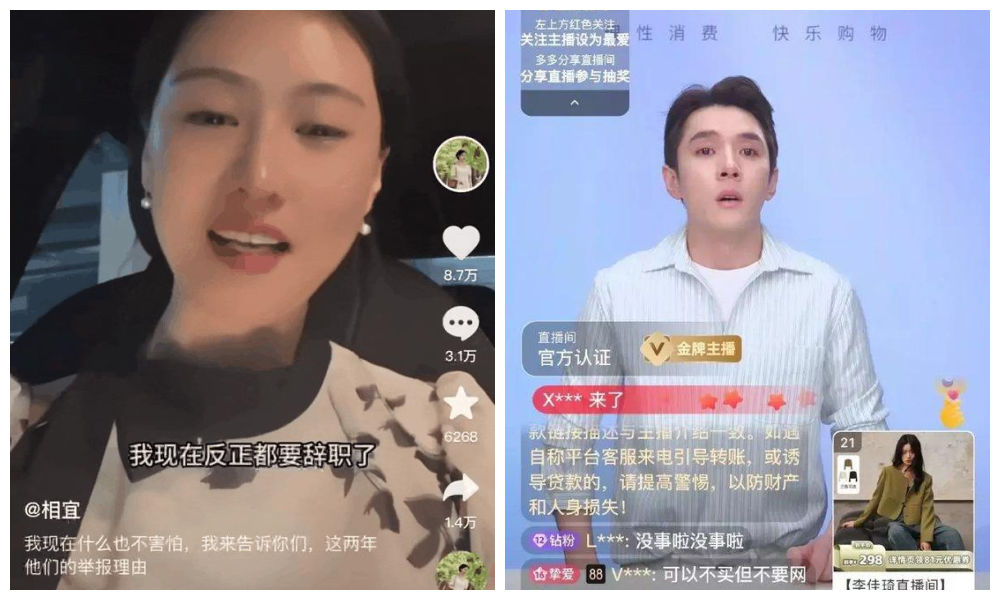
In their recent videos, ‘teacher influencer’ and ‘beauty influencer’ Xiangyi and Li Jiaqi both cried and showed remorse over the controversy triggered by their livestreams.
Another recent social media controversy revolved around a photo on Apple’s Chinese-language webpage. It featured an Asian-looking individual with braided hair, leading some Chinese netizens to claim it insulted China. They believed the hairstyle resembled a queue, worn by male subjects during the Qing dynasty, and that Apple had deliberately and inappropriately used such an image to show Chinese individuals as being backward and unattractive.
It has since become evident that many assumptions about the image were unfounded. Contrary to the initial belief that the photo was exclusive to the Chinese page, the image appeared on Apple’s websites in multiple countries and featured a California-based Native American female employee, not of Chinese descent.
Nevertheless, many internet users and bloggers insisted that brands operating in China should pay more attention to the cultural context they operate in to avoid offending consumers. Although some also acknowledged the controversy was “excessive” or “overly sensitive,” a seeming majority still stood by their initial reaction to the photo.
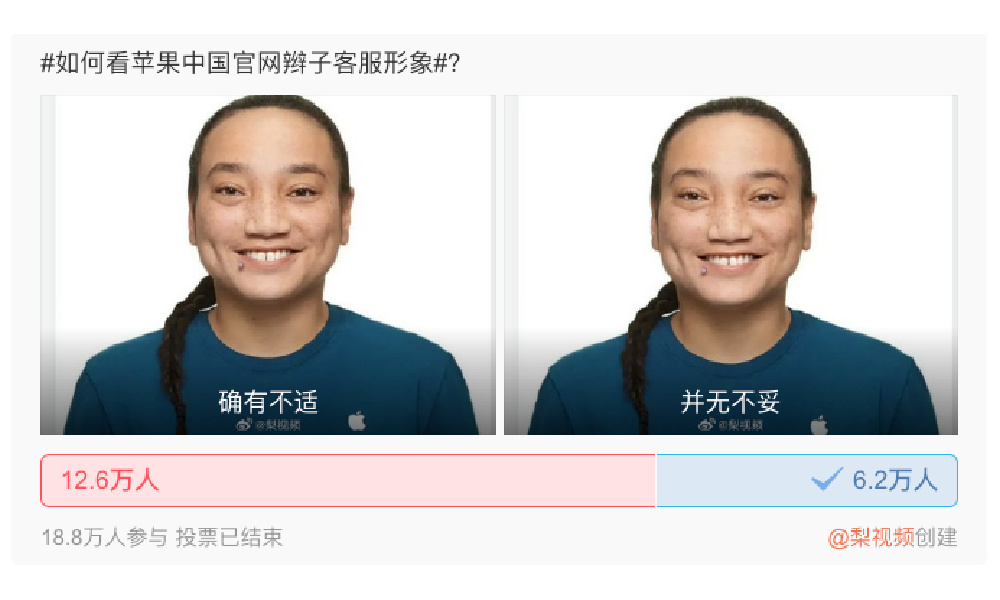
This Weibo poll shows the image that caused controversy recently, with a majority of respondents suggesting this photo is “inappropriate.”
In recent years, many incidents that unfolded on Chinese social media, either in livestreams, online advertisements, or Weibo posts, have demonstrated that minor missteps can cause social media storms. One wrongly chosen word, image, or outfit can start an almost unstoppable wave of criticism that can end careers, close doors, and terminate accounts.
But what happens once livestreamers, celebrities, and brands have to watch their every single move? How does constant scrutiny affect creativity, humor, and authenticity? When the fear of causing offense becomes a threat to one’s reputation and livelihood, can open discussions still thrive? Are there still any images, advertisements, livestream channels or websites immune to controversy?
This discussion echoes debates seen on Western social media, where so-called ‘wokeness’ has become so divisive that it is harming support for the very issues it aims to be highlighting while ‘cancel culture’ can have detrimental impact on anyone whose opinions stir controversy.
In the Chinese context, social media has become an even greater pressure cooker for brands, influencers, and celebrities. Besides taking into account the legal limits of what they can say or do online, they must also navigate a labyrinth of unwritten rules, including those promoting moral and cultural values, projecting positivity and patriotism, all while delicately considering geopolitical and economic sensitivities.
Lately, some people have speculated that Li Jiaqi’s outburst during his livestream might have been a result of burnout and mental health issues stemming from years of striving to please various stakeholders, including audiences, companies, sponsors, platforms, and the media. It might be one of the most plausible observations about the situation. Regardless of the allure of money and fame, being an online influencer under constant public scrutiny on Chinese social media seems like an utterly exhausting job to have.
Best,
Manya (@manyapan)
What’s Trending

1: Cross-Generational Living | Chinese nursing homes are changing their image in the social media age. While Chinese vloggers experiment with living in old people’s homes, and nursing homes are modernizing their facilities, some senior care centers are offering young people the chance to reside in their communities for free – as long as they spend some time with their elderly residents.
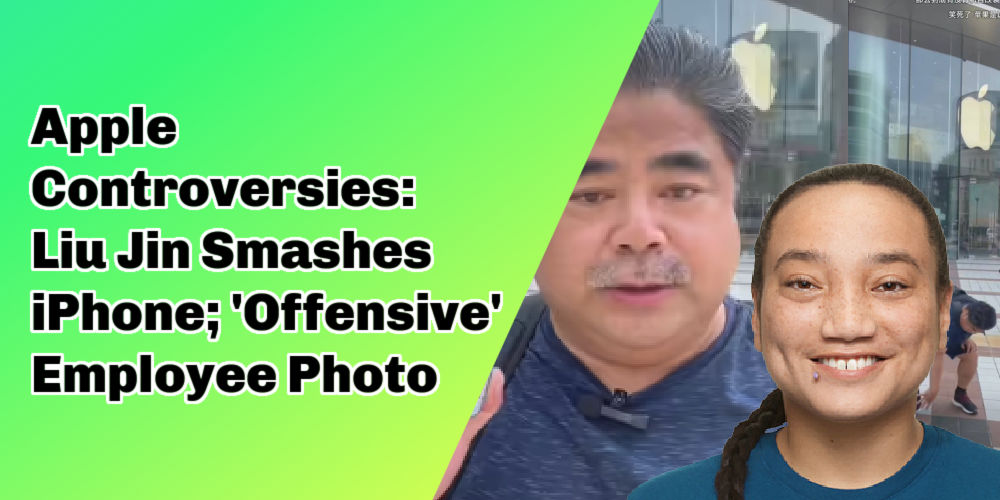
2: Bad Apples? | There is a lot of Apple anger on Chinese social media this week. Two separate trending topics have ignited discussions. One revolves around Chinese actor Liu Jin, who smashed his iPhone 13 Pro Max in front of the Apple flagship store, while another one centers on an image of an Apple employee deemed inappropriate by Chinese netizens. But both viral trends have unfolded with surprisingly ‘juicy’ twists.

3: The Lipstick King Controversy | Li Jiaqi, also known as Austin Li the ‘Lipstick King,’ has become the focus of intense media attention in China over the two weeks. The controversy began when the popular beauty influencer responded with apparent annoyance to a viewer’s comment about the high price of an eyebrow pencil. As a result, his fans began unfollowing him, netizens started scolding him, Chinese state criticized him, and the memes started flooding in. Why did this case blow up? We explore three reasons.
What More to Know
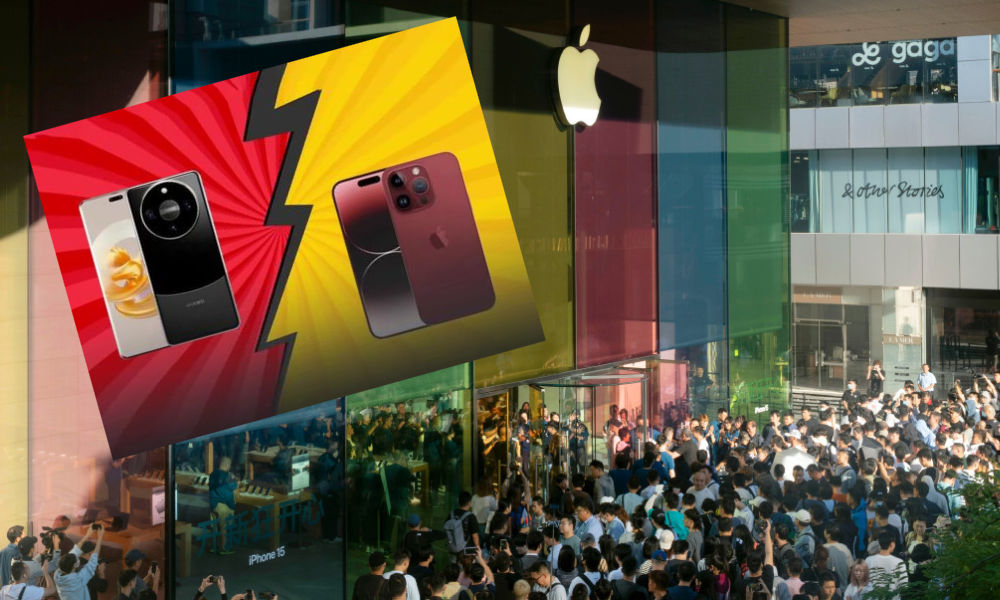
Background photo: Lining up for Apple’s Pro Series in Beijing while the Huawei vs iPhone rivalry is flaring up. Image via Sina News.
◼︎ 1. Panic over Prefab Meals. As the new school season has started, the word “yùzhìcài” (预制菜), ‘pre-fabricated meal,’ is all over Chinese social media this week. This is partly because of angry parents discovering that their children’s school cafeterias have transitioned from freshly prepared meals to ready-made ones. This is part of a broader trend in China that has risen over recent years, but there is significant resistance to this change due to concerns over the meals lacking nutrition, containing too many additives, and not being safe enough. The Chinese Ministry of Education has responded to the controversy by stating that they do not encourage the widespread adoption of pre-made meals in schools; there is currently no nationally established unified standard for ready-made meals, and the top priority should be the “nutrition and healthy development of children.” (Various hashtags on Weibo, such as “CNR Discusses How Ready-Made Meals Are entering the Campus” #央广网评预制菜进校园#, 110 million views).
◼︎ 2. PhD Student Suicide. The death of a PhD student at Northwestern Polytechnical University (西北工业大学) in Xi’an became a major topic on Chinese social media this week. The male student, who majored in material science, faced challenges in both his studies and mental well-being. In the period before he jumped to his death, the man had exhibited unusual behavior and voiced concerns about others accessing his phone and computer. His death sparked conversations about the pressures faced by PhD students in China, particularly in STEM fields, and the concerning rate of depression among them. (Hashtag “31-Year-Old PhD Student Dies after Jumping Off Dorm Building” #31岁博士生宿舍楼坠楼身亡#, 160 million views).
◼︎ 3. Body Parts Found in Shijiazhuang. In a residential community in the Qiaoxi District of Shijiazhuang, neighbors were shocked when human body parts were found scattered around a residential building. Initially, fears of a homicide case spread across Chinese social media. However, the official investigation into the incident has since determined that it was not a homicide but a possible suicide. The victim has been identified as a 28-year-old woman who collided with a second-floor balcony during her fall from the building, resulting in the separation of her limbs. Foul play has now been ruled out. (Hashtag “Shijiazhuang Neighborhood: Remains of Human Body Suspected to Be Female” #石家庄某小区尸体残肢疑为女性#, 100 million views).
◼︎ 4. Uniqlo Incident. An incident that happened at a Uniqlo store in Xining on September 18 became a big topic of discussion. A female customer who was suspected of not paying for her purchases was physically restrained by two staff members who grabbed her by the neck and dragged her to the checkout counter. The incident quickly gained the attention of netizens after an eye-witness shared a video of the female customer breaking down in tears at the store. It later turned out that the customer had actually paid for all of her items, and the store staff was condemned for their violent behavior. The Uniqlo store in question was temporarily closed in light of the incident. (Hashtag: Female Customer Grabbed by Uniqlo Staff, Dragged Back to Checkout Counter” #女顾客被优衣库工作人员掐脖子拖回收银台#, 220 million views).
◼︎ 5. Bao’an Dies after Working in Hot Room The recent death of a 48-year-old security guard (commonly called ‘bao’an‘ 保安 in Chinese) has stirred significant online discussions after details surrounding the man’s death were exposed by his relatives. The man. Mr. Zhao, died a sudden death in his dormitory at night after another day working in the very hot security room where he spent most of his days. His wife later claimed the man worked 12-hour long shifts and had not had a day off for 190 days straight. On average, he worked 360 hours per month at the company, where he had worked for 14 years. His workplace, a cramped 10-square-meter room, was exposed to direct sunlight. During July and August, when the indoor temperature at his workplace exceeded 40°C (104°F), the man’s employer provided nothing but an electric fan to cool the security room. The family believes that the company seriously violated national laws, neglected the lives of its employees, and eventually led to Mr. Zhao’s “death by overwork” while being exposed to extreme temperatures. (Hashtag: “Bao’an Who Died in Hot Dorm Previously Complained about Heat in Room on Wechat Moments Four Times” #保安宿舍猝死曾4次发朋友圈称执勤室好热#, 260 million views).
◼︎ 6. iPhone 15 versus Huawei Mate 60. The rivalry between Apple and Huawei has been a trending topic lately, especially with Apple’s recent launch of the iPhone 15 shortly after Huawei introduced its latest flagship, the Mate 60 Pro 5G. While it’s evident which smartphone brand holds more favor in terms of nationalistic sentiments, criticism of Apple and its iPhone often appears to be more about words than actions. Thousands of Chinese consumers lined up for the latest iPhone model’s launch on Friday morning, and online sales saw a significant surge. (Hashtag “Do You Want the iPhone 15 or Huawei Mate 60?” #你要iphone15还是华为mate60#, 140 million views; “iPhone 15” #iphone15#, 710 million views).
◼︎ 7. Chinese Tourists: No Visa Needed for Thailand As of September 25, Chinese nationals can enter Thailand without a visa for a temporary stay of up to thirty days. This visa exemption, which will be in effect until February 29, was initiated by Prime Minister Srettha Thavisin as a measure to boost local tourism. It is expected to attract an additional 5 million tourists to Thailand. Many netizens on Weibo expressed their excitement and welcomed this news. Earlier this year, Thailand gained popularity for its warm reception of Chinese tourists in the post-pandemic travel era. Thai authorities not only waived the requirement for Covid tests or vaccination proof but also went the extra mile by having Cabinet ministers personally greet Chinese tourists at Bangkok’s airport with flowers and gifts. (Hashtag: “Thailand Implements 5-Month Visa-Free Policy for China” #泰国对中国实施5个月免签政策#, 110 million clicks).
◼︎ 8. Putin is Coming to China. Over the past two weeks, while social and societal topics have taken the spotlight on Weibo and Douyin trending lists, there have also been trending discussions related to geopolitical affairs, with a particular focus on Vladimir Putin. Firstly, this was due to Putin’s significant meeting with Kim Jong-un. Secondly, China’s top diplomat, Wang Yi, had a meeting with the Russian president in St. Petersburg this week. During their discussions, Putin confirmed his upcoming visit to Beijing in October for the Belt and Road Summit. This topic garnered significant attention, making headlines in multiple news outlets and ranking high in top trends on Baidu News. (Hashtags “Putin Meets Wang Yi #普京会见王毅#, 64 million views; “China Responds to Putin’s October Beijing Visit” #中方回应普京10月将访华#, 300k views).
What Lies Behind
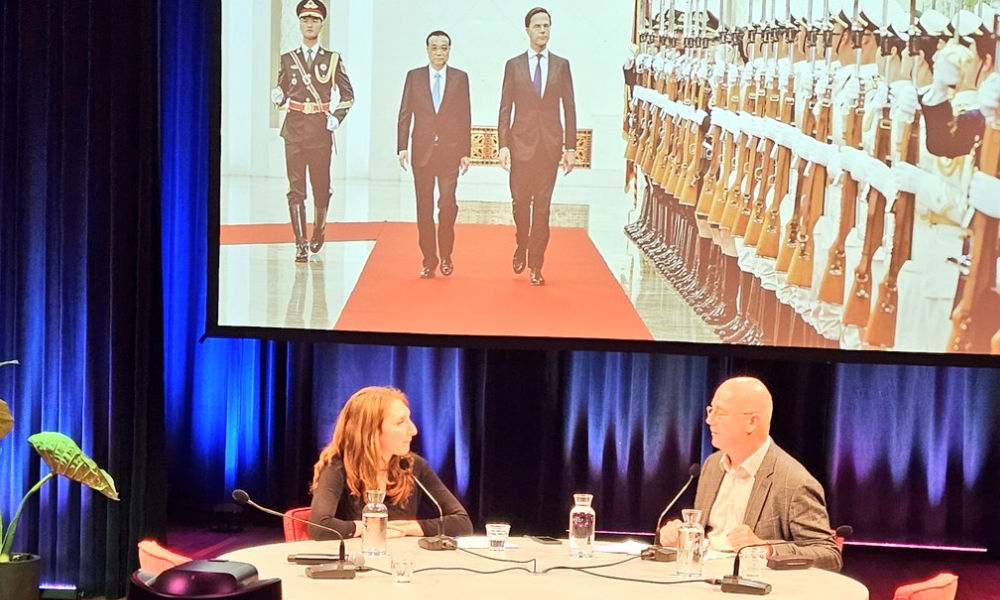
Dr. Pieke on China’s Influence and Interference
From suspicious balloons to new counter-espionage laws, there has been extensive discourse surrounding possible foreign interference in China over the past year. However, discussions about Chinese influence in foreign countries are equally lively, if not more intense.
Earlier this week, Amsterdam’s De Balie discussion center hosted an event dedicated to Chinese influence in Europe, with a particular focus on the Netherlands. At the core of this discussion was Professor Frank Pieke’s research (formerly of the University of Oxford and MERICS Berlin, now at Leiden University) on the influence and interference of the People’s Republic of China among the Chinese population in the Netherlands. This research was conducted on behalf of the Ministries of Justice and Security, Foreign Affairs, and Defense.
During the event, Pieke offered valuable insights and urged the audience to approach discussions about China’s political influence on other countries with greater nuance. Pieke argued that, both in the Dutch context and elsewhere, reactions to China are increasingly based on stereotypes or preconceived notions rather than the actual situation. Over the years, political institutions in the West and journalism have become more biased toward China, a trend that Pieke finds concerning.
This bias and preconception have a twofold impact. Firstly, it hampers relations with China, which are mutually beneficial in many ways. Secondly, it blinds us to the real concerns that Europe and other Western countries should have.
Pieke pointed out, “Nowadays, there is a tendency in ongoing debates to lump together all forms of contact with China and categorize it as ‘Chinese interference,’ whether it’s a friendly conversation over a cup of coffee, a briefing by the Chinese embassy, espionage activities by Chinese companies, or the way the Chinese government tries to influence people. This is something I continually caution against.”
Pieke emphasized the need to encourage extensive contact with China, as there are numerous forms of Sino-Dutch and Sino-foreign relations that are not only harmless but also desirable and fruitful. However, Pieke cautioned that certain trends and developments have the potential to be harmful, and Dutch authorities should pay special attention to these.
As long as we maintain bias and categorize all forms of contact with China together, the process of addressing these specific issues becomes nearly impossible. This simplistic portrayal of everything related to China or the Party as bad, evil, or unwanted hinders constructive dialogue and effective policy-making.
Meanwhile, Pieke found that while the Communist Party does indeed exert influence over Chinese organizations and media abroad, this influence is used sparingly in practice. In essence, there is relatively little direct interference; they have the potential for it but do not extensively employ it in Dutch society.
A significant finding from Pieke’s research is that Chinese individuals living in Holland either do not perceive this influence or hold limited opinions about it. What can be observed though, is that Chinese in the Netherlands adjust their behavior based on what they believe may be viewed as ‘desirable’ or ‘undesirable’ by both the Chinese government and other Chinese individuals in their overseas communities. Pieke labels this as a form of “soft power” or “soft threat,” distinct from self-censorship. The primary control of this ‘influence’ predominantly rests with overseas Chinese themselves.
What’s Noteworthy
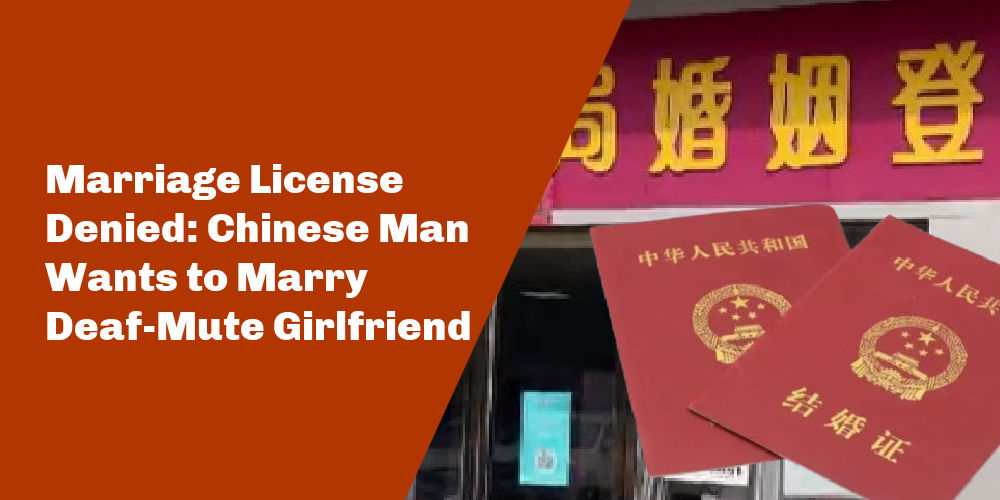
No Consent Given | A man from Gongyi, Zhengzhou, Henan, recently became a trending topic on Chinese social media due to the denial of his marriage license application with his girlfriend, who is deaf and mute. According to Chinese media reports, both sets of parents had consented to the marriage, and the couple had already taken their wedding photos. However, the local Bureau of Civil Affairs rejected their application, citing the requirement for both parties to independently declare their intention to marry. The woman, who had never attended a school for the Deaf, lacked the ability to use sign language, write, or communicate effectively. The Bureau advised the couple to return once she had completed her education and could express her desire to marry.
As news of this incident circulated on Chinese social media, many people praised the “responsible decision” of the local Bureau of Civil Affairs. Last year, one human trafficking case gained national prominence after a TikTok vlogger exposed the horrific living conditions of a woman in Xuzhou who appeared to be unable to communicate. She was married with eight children and kept in a shed next to the house, tied to a chain. It later turned out that local officials made errors in properly checking and verifying when approving the marriage certificate. Read more about the Xuzhou woman case here.
What’s Popular
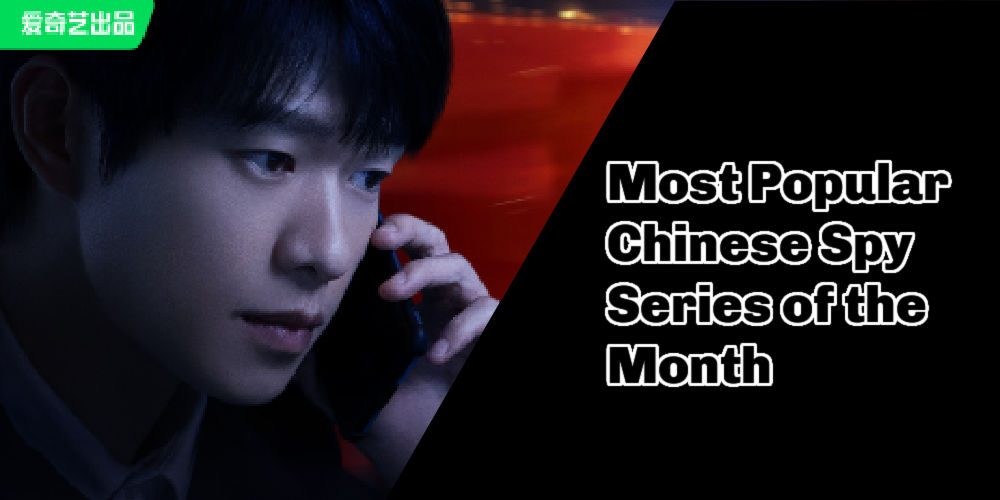
Secret Agent Missions | While espionage and foreign influence is a popular topic in Chinese media and foreign policy, they are also recurring themes in popular culture. Throughout the years, China has produced numerous TV series centered around espionage. The latest Chinese sensation in this genre is Spy Game (特工任务), which delves into the challenging work of Chinese national security in countering foreign spy activities and safeguarding the nation’s security.
One of the main characters in the series is Huang Zicheng (黄子诚), portrayed by Chinese actor Wei Daxun (魏大勋). Huang inadvertently becomes entangled in spy-related affairs and ultimately becomes an informant for the National Security Bureau. However, as he operates within a web of conspiracies and foreign influence, he struggles to see who he can trust or what is real.
With millions of viewers tuning in to this hit series since its premiere on September 20, the hashtag #Huang Zicheng Admits Involvement in Spy Activities” (#黄子诚涉及间谍行为提出自首#) went trending on Chinese social media this week, attracting a staggering 430 million views.
If you’d like to tune into this series, it’s available on iQiyi and also on YouTube with English subtitles. You can start with the first episode here. (They just released the fifth episode last night).
What’s Memorable
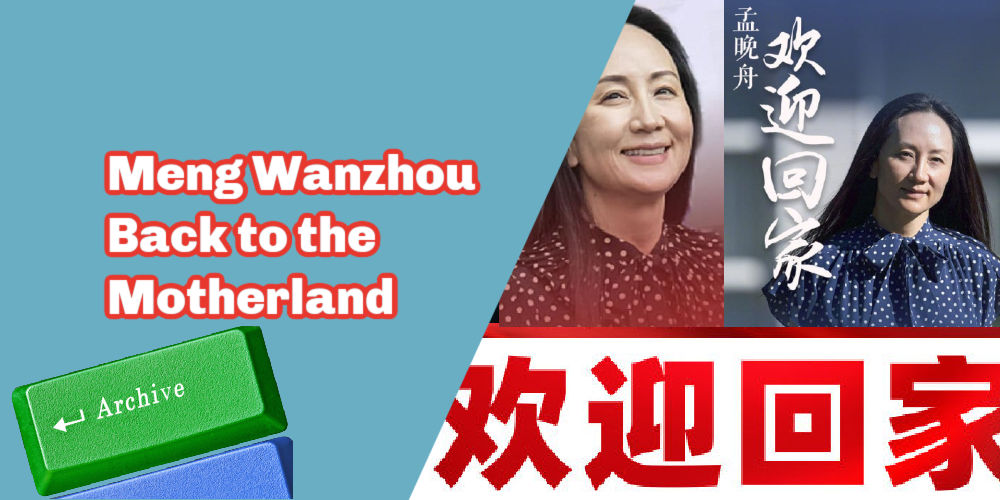
Huawei’s Daughter | In this time of Apple-Huawei rivalry, it is clear that the ongoing tech giant competition in China is about much more than smartphones alone and has come to symbolize geopolitical rivalry, encompassing themes of nationalism, anti-Western sentiments, and a growing sense of pride in products made in China. In this context, it is perhaps not surprising that Huawei decided to let its launch ceremony coincide with the second anniversary of Huawei executive Meng Wanzhou’s return to China from house arrest in Canada back in 2023 (September 25).
In this throwback from our archives, you can read more about Meng Wanzhou’s (孟晚舟) homecoming to China. It had been almost three years since the Chief Financial Officer (CFO) of Huawei and the daughter of Huawei founder Ren Zhengfei was initially detained in Canada during a layover at Vancouver airport at the request of U.S. officials. In 2019, we reported on how the Meng Wanzhou case sparked anti-American and pro-Huawei sentiments on Weibo (link). By linking its highly-anticipated launch ceremony to Meng’s return, Huawei is further emphasizing its role as a major player in the geopolitical rivalry landscape.
Weibo Word of the Week
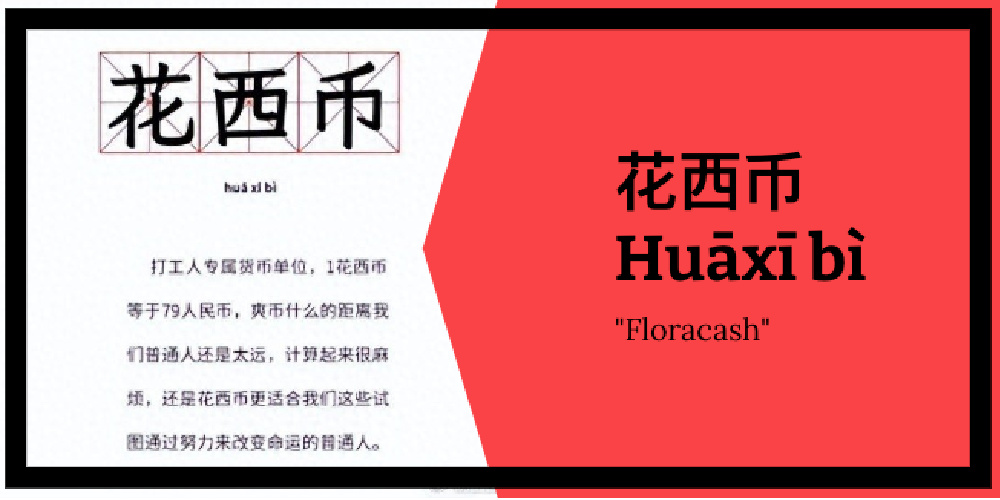
“Huaxi Coins” | Our Weibo Word of the Week is “花西币” (Huāxī bì), which translates to “Huaxi coins” or “Floracash.”
By now, you’re probably aware of all the controversy surrounding China’s most famous beauty influencer Li Jiaqi that followed a livestream he did to promote the Chinese make-up brand Florasis, which is known as Huāxīzǐ (花西子) in China.
After some viewers questioned whether a single eyebrow pencil costing 79 yuan ($11) was too expensive, Li lashed out and suggested viewers should instead ask themselves if they worked hard enough to deserve a raise.
The incident sparked a series of memes and discussions, and among them the question of what one can buy with 79 yuan in China today was a big one. While some suggested they could feed an entire family for one day with that money, others said that it would buy their office lunches for a week.
This humorous situation gave rise to the term ‘Huaxi Coins’ or ‘Floracash,’ with netizens playfully using the eyebrow pencil’s price as a new currency unit, where one Huaxi Coin equals 79 yuan. People have even started jokingly expressing their earnings in Huaxi Coins, and some proudly mention the cost of snacks or meals, saying things like ‘it only cost me a quarter in Floracash for three’ or ‘tonight’s dinner was just half a Huaxi Coin!'”
This is an on-site version of the Weibo Watch newsletter by What’s on Weibo. Missed last week’s newsletter? Find it here. If you are already subscribed to What’s on Weibo but are not yet receiving this newsletter in your inbox, please contact us directly to let us know.
Manya Koetse is the founder and editor-in-chief of whatsonweibo.com. She is a writer, public speaker, and researcher (Sinologist, MPhil) on social trends, digital developments, and new media in an ever-changing China, with a focus on Chinese society, pop culture, and gender issues. She shares her love for hotpot on hotpotambassador.com. Contact at manya@whatsonweibo.com, or follow on Twitter.

Also Read
China Insight
The Tragic Story of “Fat Cat”: How a Chinese Gamer’s Suicide Went Viral
The story of ‘Fat Cat’ has become a hot topic in China, sparking widespread sympathy and discussions online.
Published
15 hours agoon
May 9, 2024
The tragic story behind the recent suicide of a 21-year-old Chinese gamer nicknamed ‘Fat Cat’ has become a major topic of discussion on Chinese social media, touching upon broader societal issues from unfair gender dynamics to businesses taking advantage of grieving internet users.
The story of a 21-year-old Chinese gamer from Hunan who committed suicide has gone completely viral on Weibo and beyond this week, generating many discussions.
In late April of this year, the young man nicknamed ‘Fat Cat’ (胖猫 Pàng Māo, literally fat or chubby cat), tragically ended his life by jumping into the river near the Chongqing Yangtze River Bridge (重庆长江大桥) following a breakup with his girlfriend. By now, the incident has come to be known as the “Fat Cat Jumping Into the River Incident” (胖猫跳江事件).
News of his suicide soon made its rounds on the internet, and some bloggers started looking into what was behind the story. The man’s sister also spoke out through online channels, and numerous chat records between the young man and his girlfriend emerged online.
One aspect of his story that gained traction in early May is the revelation that the man had invested all his resources into the relationship. Allegedly, he made significant financial sacrifices, giving his girlfriend over 510,000 RMB (approximately 71,000 USD) throughout their relationship, in a time frame of two years.
When his girlfriend ended the relationship, despite all of his efforts, he was devastated and took his own life.
The story was picked up by various Chinese media outlets, and prominent social and political commentator Hu Xijin also wrote a post about Fat Cat, stating the sad story had made him tear up.
As the news spread, it sparked a multitude of hashtags on Weibo, with thousands of netizens pouring out their thoughts and emotions in response to the story.
Playing Games for Love
The main part of this story that is triggering online discussions is how ‘Fat Cat,’ a young man who possessed virtually nothing, managed to provide his girlfriend, who was six years older, with such a significant amount of money – and why he was willing to sacrifice so much in order to do so.
The young man reportedly was able to make money by playing video games, specifically by being a so-called ‘booster’ by playing with others and helping them get to a higher level in multiplayer online battle games.
According to his sister, he started working as a ‘professional’ video gamer as a means of generating money to satisfy his girlfriend, who allegedly always demanded more.
He registered a total of 36 accounts to receive orders to play online games, making 20 yuan per game (about $2.80). Because this consumed all of his time, he barely went out anymore and his social life was dead.
In order to save more money, he tried to keep his own expenses as low as possible, and would only get takeout food for himself for no more than 10 yuan ($1,4). His online avatar was an image of a cat saying “I don’t want to eat vegetables, I want to eat McDonald’s.”

The woman in question who he made so many sacrifices for is named Tan Zhu (谭竹), and she soon became the topic of public scrutiny. In one screenshot of a chat conversation between Tan and her boyfriend that leaked online, she claimed she needed money for various things. The two had agreed to get married later in this year.
Despite of this, she still broke up with him, driving him to jump off the bridge after transferring his remaining 66,000 RMB (9135 USD) to Tan Zhu.
As the story fermented online, Tan Zhu also shared her side of the story. She claimed that she had met ‘Fat Cat’ over two years ago through online gaming and had started a long distance relationship with him. They had actually only met up twice before he moved to Chongqing. She emphasized that financial gain was never a motivating factor in their relationship.
Tan additionally asserted that she had previously repaid 130,000 RMB (18,000 USD) to him and that they had reached a settlement agreement shortly before his tragic death.
Ordering Take-Out to Mourn Fat Cat
– “I hope you rest in peace.”
– “Little fat cat, I hope you’ll be less foolish in your next life.”
– “In your next life, love yourself first.”
These are just a few of the messages left by netizens on notes attached to takeout food deliveries near the Chongqing Yangtze River Bridge.
As Fat Cat’s story stirred up significant online discussion, with many expressing sympathy for the young man who rarely indulged in spending on food and drinks, some internet users took the step of ordering McDonalds and other food delivery services to the bridge, where he tragically jumped from, in his honor.
This soon snowballed into more people ordering food and drinks to the bridge, resulting in a constant flow of delivery staff and a pile-up of take-out bags.

Delivery food on the bridge, photo via Weibo.
However, as the food delivery efforts picked up pace, it came to light that some of the deliveries ordered and paid for were either empty or contained something different; certain restaurants, aware of the collective effort to honor the young man, deliberately left the food boxes empty or substituted sodas or tea with tap water.

At least five restaurants were caught not delivering the actual orders. Chinese bubble tea shop ChaPanda was exposed for substituting water for milk tea in their cups. On May 3rd, ChaPanda responded that they had fired the responsible employee.
Another store, the Zhu Xiaoxiao Luosifen (朱小小螺蛳粉), responded on that they had temporarily closed the shop in question to deal with the issue. Chinese fast food chain NewYobo (牛约堡) also acknowledged that at least twenty orders they received were incomplete.
Fast food company Wallace (华莱士) responded to the controversy by stating they had dismissed the employees involved. Mixue Ice Cream & Tea (蜜雪冰城) issued an apology and temporarily closed one of their stores implicated in delivering empty orders.
In the midst of all the controversy, Fat Cat’s sister asked internet users to refrain from ordering take-out food as a means of mourning and honoring her brother.
Nevertheless, take-out food and flowers continued to accumulate near the bridge, prompting local authorities to think of ways of how to deal with this unique method of honoring the deceased gamer.
Gamer Boy Meets Girl
On Chinese social media, this story has also become a topic of debate in the context of gender dynamics and social inequality.
There are some male bloggers who are angry with Tan Zhu, suggesting her behaviour is an example of everything that’s supposedly “wrong” with Chinese women in this day and age.
Others place blame on Fat Cat for believing that he could buy love and maintain a relationship through financial means. This irked some feminist bloggers, who see it as a chauvinistic attitude towards women.
A main, recurring idea in these discussions is that young Chinese men such as Fat Cat, who are at the low end of the social ladder, are actually particularly vulnerable in a fiercely competitive society. Here, a gender imbalance and surplus of unmarried men make it easier for women to potentially exploit those desperate for companionship.
The story of Fat Cat brings back memories of ‘Mo Cha Official,’ a not-so-famous blogger who gained posthumous fame in 2021 when details of his unhappy life surfaced online.
Likewise, the tragic tale of WePhone founder Su Xiangmao (苏享茂) resurfaces. In 2017, the 37-year-old IT entrepreneur from Beijing took his own life, leaving behind a note alleging blackmail by his 29-year-old ex-wife, who demanded 10 million RMB (±1.5 million USD) (read story).
Another aspect of this viral story that is mentioned by netizens is how it gained so much attention during the Chinese May holidays, coinciding with the tragic news of the southern China highway collapse in Guangdong. That major incident resulted in the deaths of at least 48 people, and triggered questions over road safety and flawed construction designs. Some speculate that the prominence given to the Fat Cat story on trending topic lists may have been a deliberate attempt to divert attention away from this incident.
‘Fat Cat’ was cremated. His family stated their intention to take necessary legal steps to recover the money from his former girlfriend, but Tan Zhu reportedly already reached an agreement with the father and settled the case. Nevertheless, the case continues to generate discussions online, with some people wondering: “Is it over yet? Can we talk about something different now?”

Fat Cat images projected in Times Square
However, given that images of the ‘Fat Cat’ avatar have even appeared in Times Square in New York by now (Chinese internet users projected it on one of the big LED screens), it’s likely that this story will be remembered and talked about for some time to come.
By Manya Koetse
– With contributions by Miranda Barnes and Ruixin Zhang
Independently reporting China trends for over a decade. Like what we do? Support us and get the story behind the hashtag by subscribing:
Spotted a mistake or want to add something? Please let us know in comments below or email us. First-time commenters, please be patient – we will have to manually approve your comment before it appears.
©2024 Whatsonweibo. All rights reserved. Do not reproduce our content without permission – you can contact us at info@whatsonweibo.com.
China Brands, Marketing & Consumers
A Brew of Controversy: Lu Xun and LELECHA’s ‘Smoky’ Oolong Tea
Chinese tea brand LELECHA faced backlash for using the iconic literary figure Lu Xun to promote their “Smoky Oolong” milk tea, sparking controversy over the exploitation of his legacy.
Published
7 days agoon
May 3, 2024
It seemed like such a good idea. For this year’s World Book Day, Chinese tea brand LELECHA (乐乐茶) put a spotlight on Lu Xun (鲁迅, 1881-1936), one of the most celebrated Chinese authors the 20th century and turned him into the the ‘brand ambassador’ of their special new “Smoky Oolong” (烟腔乌龙) milk tea.
LELECHA is a Chinese chain specializing in new-style tea beverages, including bubble tea and fruit tea. It debuted in Shanghai in 2016, and since then, it has expanded rapidly, opening dozens of new stores not only in Shanghai but also in other major cities across China.
Starting on April 23, not only did the LELECHA ‘Smoky Oolong” paper cups feature Lu Xun’s portrait, but also other promotional materials by LELECHA, such as menus and paper bags, accompanied by the slogan: “Old Smoky Oolong, New Youth” (“老烟腔,新青年”). The marketing campaign was a joint collaboration between LELECHA and publishing house Yilin Press.

Lu Xun featured on LELECHA products, image via Netease.
The slogan “Old Smoky Oolong, New Youth” is a play on the Chinese magazine ‘New Youth’ or ‘La Jeunesse’ (新青年), the influential literary magazine in which Lu’s famous short story, “Diary of a Madman,” was published in 1918.
The design of the tea featuring Lu Xun’s image, its colors, and painting style also pay homage to the era in which Lu Xun rose to prominence.
Lu Xun (pen name of Zhou Shuren) was a leading figure within China’s May Fourth Movement. The May Fourth Movement (1915-24) is also referred to as the Chinese Enlightenment or the Chinese Renaissance. It was the cultural revolution brought about by the political demonstrations on the fourth of May 1919 when citizens and students in Beijing paraded the streets to protest decisions made at the post-World War I Versailles Conference and called for the destruction of traditional culture[1].
In this historical context, Lu Xun emerged as a significant cultural figure, renowned for his critical and enlightened perspectives on Chinese society.
To this day, Lu Xun remains a highly respected figure. In the post-Mao era, some critics felt that Lu Xun was actually revered a bit too much, and called for efforts to ‘demystify’ him. In 1979, for example, writer Mao Dun called for a halt to the movement to turn Lu Xun into “a god-like figure”[2].
Perhaps LELECHA’s marketing team figured they could not go wrong by creating a milk tea product around China’s beloved Lu Xun. But for various reasons, the marketing campaign backfired, landing LELECHA in hot water. The topic went trending on Chinese social media, where many criticized the tea company.
Commodification of ‘Marxist’ Lu Xun
The first issue with LELECHA’s Lu Xun campaign is a legal one. It seems the tea chain used Lu Xun’s portrait without permission. Zhou Lingfei, Lu Xun’s great-grandson and president of the Lu Xun Cultural Foundation, quickly demanded an end to the unauthorized use of Lu Xun’s image on tea cups and other merchandise. He even hired a law firm to take legal action against the campaign.
Others noted that the image of Lu Xun that was used by LELECHA resembled a famous painting of Lu Xun by Yang Zhiguang (杨之光), potentially also infringing on Yang’s copyright.
But there are more reasons why people online are upset about the Lu Xun x LELECHA marketing campaign. One is how the use of the word “smoky” is seen as disrespectful towards Lu Xun. Lu Xun was known for his heavy smoking, which ultimately contributed to his early death.
It’s also ironic that Lu Xun, widely seen as a Marxist, is being used as a ‘brand ambassador’ for a commercial tea brand. This exploits Lu Xun’s image for profit, turning his legacy into a commodity with the ‘smoky oolong’ tea and related merchandise.
“Such blatant commercialization of Lu Xun, is there no bottom limit anymore?”, one Weibo user wrote. Another person commented: “If Lu Xun were still alive and knew he had become a tool for capitalists to make money, he’d probably scold you in an article. ”
On April 29, LELECHA finally issued an apology to Lu Xun’s relatives and the Lu Xun Cultural Foundation for neglecting the legal aspects of their marketing campaign. They claimed it was meant to promote reading among China’s youth. All Lu Xun materials have now been removed from LELECHA’s stores.

Statement by LELECHA.
On Chinese social media, where the hot tea became a hot potato, opinions on the issue are divided. While many netizens think it is unacceptable to infringe on Lu Xun’s portrait rights like that, there are others who appreciate the merchandise.
The LELECHA controversy is similar to another issue that went trending in late 2023, when the well-known Chinese tea chain HeyTea (喜茶) collaborated with the Jingdezhen Ceramics Museum to release a special ‘Buddha’s Happiness’ (佛喜) latte tea series adorned with Buddha images on the cups, along with other merchandise such as stickers and magnets. The series featured three customized “Buddha’s Happiness” cups modeled on the “Speechless Bodhisattva” (无语菩萨), which soon became popular among netizens.

The HeyTea Buddha latte series, including merchandise, was pulled from shelves just three days after its launch.
However, the ‘Buddha’s Happiness’ success came to an abrupt halt when the Ethnic and Religious Affairs Bureau of Shenzhen intervened, citing regulations that prohibit commercial promotion of religion. HeyTea wasted no time challenging the objections made by the Bureau and promptly removed the tea series and all related merchandise from its stores, just three days after its initial launch.
Following the Happy Buddha and Lu Xun milk tea controversies, Chinese tea brands are bound to be more careful in the future when it comes to their collaborative marketing campaigns and whether or not they’re crossing any boundaries.
Some people couldn’t care less if they don’t launch another campaign at all. One Weibo user wrote: “Every day there’s a new collaboration here, another one there, but I’d just prefer a simple cup of tea.”
By Manya Koetse
[1]Schoppa, Keith. 2000. The Columbia Guide to Modern Chinese History. New York: Columbia UP, 159.
[2]Zhong, Xueping. 2010. “Who Is Afraid Of Lu Xun? The Politics Of ‘Debates About Lu Xun’ (鲁迅论争lu Xun Lun Zheng) And The Question Of His Legacy In Post-Revolution China.” In Culture and Social Transformations in Reform Era China, 257–284, 262.
Independently reporting China trends for over a decade. Like what we do? Support us and get the story behind the hashtag by subscribing:
Spotted a mistake or want to add something? Please let us know in comments below or email us. First-time commenters, please be patient – we will have to manually approve your comment before it appears.
©2024 Whatsonweibo. All rights reserved. Do not reproduce our content without permission – you can contact us at info@whatsonweibo.com.
Popular Reads
-

 China Insight2 months ago
China Insight2 months agoThe ‘Two Sessions’ Suggestions: Six Proposals Raising Online Discussions
-

 China Arts & Entertainment3 months ago
China Arts & Entertainment3 months agoTop 9 Chinese Movies to Watch This Spring Festival Holiday
-

 China Arts & Entertainment3 weeks ago
China Arts & Entertainment3 weeks ago“Old Bull Eating Young Grass”: 86-Year-Old Chinese Painter Fan Zeng Marries 36-Year-Old Xu Meng
-

 China Media2 months ago
China Media2 months agoParty Slogan, Weibo Hashtag: “The Next China Will Still Be China”






